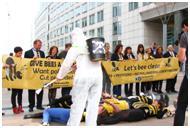
There is a certain junkyard dog mentality in the environmental movement; when they latch onto an issue, they never let go. (1)
So it goes with the targeted pesticide class called neonicotinoids (neonics, for short). A decade ago, a sudden die-off in some regional honey bee hives got the fundraising juggernaut rolling to protect us from yet another apocalypse. And they get to claim their methods have worked so far.
It's Magic Beans Science.
We warned you that X could happen unless you sent us money to buy Magic Beans so we can get Y done. X did not happen so thank the Magic Beans, and send us money to buy more.
Even Lisa Simpson knew that was specious reasoning, and she is in grade school. (2) Somehow that logic still escapes environmental donors.
The science on bee deaths was settled long ago; bees have been dying off for no real reason for as long as we have kept records of bees. It used to be given fancy names, before neonics or pesticides even existed, like Autumn Collapse, May Dwindle, Spring Dwindle and Disappearing Disease. Environmentalists promoted something more apocalyptic sounding: Colony Collapse Disorder.
Yet it was just a new name for a long-existing phenomenon. Taking surveys of bee deaths kept the hype going for a little while, but the public quickly learned that environmentalists were taking up beekeeping as a fad and that resulted in huge numbers of deaths due to mismanagement. (3) Rather than admit they had amateur incompetence, they wanted to blame pesticides.(4) And small beekeepers did nothing about varroa mites, the big killer of bees. Viruses have evolved too. Bumblebees prefer infected plants over healthy ones because the viruses cause the gene expression of plants to change to be more appealing.
A new study (5) drives another nail into this manufactured neonics coffin. American Council on Science and Health Scientific Advisor Dr. Allen Felsot, Washington State University Tri-Cities professor of entomology and environmental toxicology, and colleagues reaffirm what those versed in science know; hazard is not risk. Mainstream media certainly gets that wrong - it's why the International Agency for Research on Cancer will get attention with crazy claims like that bacon and plutonium are same level of carcinogen while any junk yard employee knows that's not true.
Yes, if we dunk enough bees in any goop, that is hazardous to them, but in the real world the risk is just not there. Instead, because neonics are targeted, they are much safer for bees than broad-spectrum pesticides. In their year-long study of 149 Washington apiaries, the neonicotinoids clothianidin and thiamethoxam were found in ~50 percent of agricultural ones and under 5 percent in rural and urban ones. Shouldn't that be a concern? In 2016, we can detect truly trace levels of just about anything. It takes mathematical wizardry and belief in hormesis to claim that a trace level of something in a Collective Dose will still cause actual harm. It hasn't been borne out in the real world.
"Our results suggest no risk of harmful effects in rural and urban landscapes and arguably very low risks from exposure in agricultural landscapes,” Felsot said.
Obviously people who donate to environmental groups are not going to believe any science study that defies their belief structure; they will instead use the language of scientists against science. Scientists write sentences like "low risks" because science won't speak in absolutes. From a practical standpoint, it means neonics are not killing bees in any setting. But activists will exaggerate the scientific use of low risk to being a colloquial "they don't know so why take the chance?"
In the real world, truck accidents kill more bees than neonics do. So bees would be better off if environmentalists stopped buying bee hives and having them delivered.
NOTES:
(1) In a way, I applaud that because it's why they win. The scaremonger group Center for Science in the Public Interest harassed and sued FDA to try and limit salt in food despite all of the evidence showing it is no issue in healthy people, and eventually FDA issued voluntary guidelines after 40 years of being pestered. And other groups likewise play the long game. When Union of Concerned Scientists couldn't get EPA to cave in on enough of their pet issues, they decided to get an employee hired there. And they did - but lacking any real qualifications they got the administration to create a special new role: "Integrity Officer." So if the science shows no harm, she can still claim it lacks integrity. Meanwhile, their former president is now Chief of Staff for the Energy Secretary. A guy who demonized both nuclear energy and natural gas now controls who gets to meet with the man in charge of our energy policy.
(2) "The Simpsons" Season 7, Episode 23: "Much Apu About Nothing"
Homer: Well, there's not a bear in sight. The Bear Patrol is sure doing its job.
Lisa: That's specious reasoning, Dad.
Homer: Thank you, sweetie.
Lisa: Dad, what if I were to tell you that this rock keeps away tigers.
Homer: Uh-huh, and how does it work?
Lisa: It doesn't work. It's just a stupid rock.
Homer: I see.
Lisa: But you don't see any tigers around, do you?
Homer: Lisa, I'd like to buy your rock.
(3) You can't just stick a bee hive in your yard and have the awesome power of nature work magic. They will die.
(4) They even read eulogies for the bees.
(5) T. J. Lawrence, E. M. Culbert, A. S. Felsot, V. R. Hebert, W. S. Sheppard, 'Survey and Risk Assessment of Apis mellifera (Hymenoptera: Apidae) Exposure to Neonicotinoid Pesticides in Urban, Rural, and Agricultural Settings', Journal of Economic Entomology, August 1 2016 DOI: 10.1093/jee/tov397



